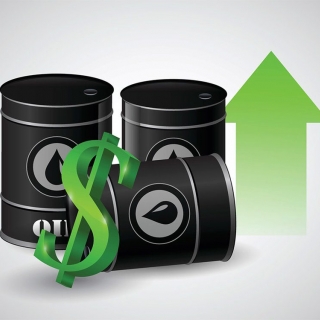


Oil prices surged on Monday to their highest since January as the United States' move over the weekend to join Israel in striking Iran's nuclear facilities stoked supply concerns.
Brent crude futures rose $1.52, or 1.97%, to $78.53 a barrel by 0503 GMT. U.S. West Texas Intermediate crude futures rose $1.51, or 2.04%, to $75.35. Both contracts jumped more than 3% earlier in the session to $81.40 and $78.40, respectively, touching five-month highs before giving up some of the gains.
The price surge came after U.S. President Donald Trump said he had "destroyed" Iran's main nuclear site in an attack over the weekend, joining Israeli strikes in an escalation of the Middle East conflict as Tehran vows to defend itself.
Iran is OPEC's third-largest crude producer. Market participants expect further price gains amid growing concerns that Iranian retaliation could include closing the Strait of Hormuz, through which about a fifth of global crude supplies pass.
"The current geopolitical escalation is providing a fundamental catalyst for (Brent) prices to move higher and potentially move towards $100, with $120 a barrel looking increasingly plausible," said Sugandha Sachdeva, founder of New Delhi-based research firm SS WealthStreet.
Iran's Press TV reported that Iran's parliament had approved a measure to close the strait. Iran has previously threatened to close the strait but never followed through.
Iran and Israel traded air and missile attacks on Monday, as global tensions escalated over Tehran's expected response to a U.S. attack on its nuclear facilities.
"The risk of damage to oil infrastructure ... has multiplied," said June Goh, senior analyst at Sparta Commodities.
Despite alternative pipeline routes out of the region, there will still be volumes of crude that cannot be fully exported if the Strait of Hormuz is inaccessible. Shippers will increasingly shy away from the region, she added.
Goldman Sachs said in a report Sunday that Brent could peak at $110 a barrel if oil flows through the vital waterway were cut in half for a month, and remain down 10% for the next 11 months. The bank still assumed no significant disruption to oil and natural gas supplies, adding to the global incentive to try and prevent a sustained and very large disruption.
Brent has risen 13% since the conflict began on June 13, while WTI has gained about 10%. Given that the Strait of Hormuz is vital to Iran's own oil exports, a vital source of its national income, a continued closure would inflict severe economic damage on Iran itself, making it a double-edged sword, Sachdeva added.
Meanwhile, Japan on Monday called for a de-escalation of the conflict in Iran, while South Korea's vice industry minister voiced concern over the potential impact of the attack on the country's trade. (alg)
Source: Reuters
Oil prices stabilized on Thursday (February 12th), as the market reassigned a risk premium to US-Iran tensions despite US inventory data showing swelling domestic supplies. This movement confirms one ...
Oil prices rose on Wednesday (February 11th), supported by a combination of geopolitical risk premiums from US-Iran tensions and more solid Asian demand signals particularly from India which helped ea...
Oil remained in the green zone on Tuesday (February 10th), as the market refused to abandon the Middle East risk premium. As of 13:07 GMT (20:07 WIB), Brent rose +0.4% to $69.32/barrel, while WTI rose...
Oil prices fell about 1% on Monday as concerns about conflict in the Middle East eased slightly. The market calmed after the US and Iran agreed to resume talks on Tehran's nuclear program, reducing fe...
Oil prices moved slightly higher in a volatile session on Friday, as investors assessed the direction of nuclear negotiations between the United States and Iran. Price movements appeared sensitive to ...
Oil prices stabilized on Thursday (February 12th), as the market reassigned a risk premium to US-Iran tensions despite US inventory data showing swelling domestic supplies. This movement confirms one thing: geopolitical headlines are still more...
Gold prices weakened slightly on Thursday (February 12th), as more solid US employment data reduced market confidence in an imminent Federal Reserve interest rate cut. The strong employment data prompted market participants to shift expectations of...
The Hang Seng Index reversed its downward trend in Hong Kong on Thursday (February 12th), weakening by around 0.9% to around 27,000 after a strong session earlier. This decline halted the momentum of the short term rally, as investors began to...